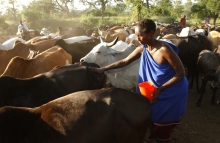 As government representatives gather to consider solutions to, and means to mitigate the impact of, climate change at the 18th Conference of Parties of the United Nations Framework Convention on Climate Change, several significant publications on the impact of climate change and Reducing Emissions from Deforestation and Forest Degradation (REDD+) on the rights of Indigenous peoples have been launched by Natural Justice partners.
As government representatives gather to consider solutions to, and means to mitigate the impact of, climate change at the 18th Conference of Parties of the United Nations Framework Convention on Climate Change, several significant publications on the impact of climate change and Reducing Emissions from Deforestation and Forest Degradation (REDD+) on the rights of Indigenous peoples have been launched by Natural Justice partners. The Asia Indigenous Peoples Pact (AIPP) and the International Work Group for Indigenous Affairs (IWGIA) have published a briefing paper entitled "REDD+, Rights and Indigenous Peoples: Lessons from REDD+ Initiatives in Asia." The brief examines how far countries participating in REDD+ in Asia have advanced in addressing the social and environmental safeguards needed for the implementation of REDD+ and reflects on pilot activities in Nepal, Cambodia and Vietnam. Their findings suggest that outstanding critical issues for Indigenous peoples include the lack of effective engagement, free, prior and informed consent, and unresolved land tenure and carbon rights issues. The brief can be downloaded here.
The Forest Peoples Programme, has released a note that refers to the Indigenous Peoples Caucus position on REDD+ and analyses key issues and opportunities for Indigenous peoples to influence the current REDD+ negotiations in Doha. The note can be downloaded here.
The Indigenous Peoples Caucus, on behalf of the International Indigenous Peoples Forum on Climate Change (IIPFCC), released a statement to the Subsidiary Body for Scientific and Technical Advice (SBSTA) concerning REDD+ which raised issues such as the need to respect collective and customary systems of forest governance and management, the roles and contributions of Indigenous women, and the need for an independent complaints mechanism. The statement can be accessed here.

































